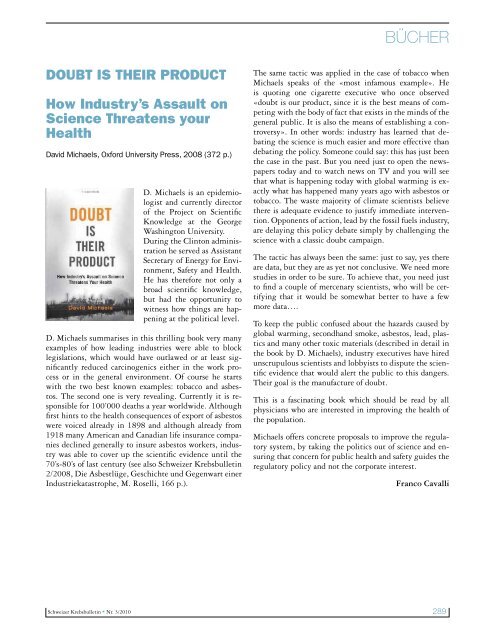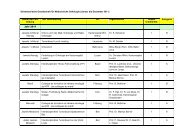Pragmatische Lösung eines komplexen Problems Schweizer ...
Pragmatische Lösung eines komplexen Problems Schweizer ...
Pragmatische Lösung eines komplexen Problems Schweizer ...
Sie wollen auch ein ePaper? Erhöhen Sie die Reichweite Ihrer Titel.
YUMPU macht aus Druck-PDFs automatisch weboptimierte ePaper, die Google liebt.
BüCHER<br />
Doubt is their Product<br />
How Industry’s Assault on<br />
Science Threatens your<br />
Health<br />
David Michaels, Oxford University Press, 2008 (372 p.)<br />
D. Michaels is an epidemiologist<br />
and currently director<br />
of the Project on Scientific<br />
Knowledge at the George<br />
Washington University.<br />
During the Clinton administration<br />
he served as Assistant<br />
Secretary of Energy for Environment,<br />
Safety and Health.<br />
He has therefore not only a<br />
broad scientific knowledge,<br />
but had the opportunity to<br />
witness how things are happening<br />
at the political level.<br />
D. Michaels summarises in this thrilling book very many<br />
examples of how leading industries were able to block<br />
legislations, which would have outlawed or at least significantly<br />
reduced carcinogenics either in the work process<br />
or in the general environment. Of course he starts<br />
with the two best known examples: tobacco and asbestos.<br />
The second one is very revealing. Currently it is responsible<br />
for 100’000 deaths a year worldwide. Although<br />
first hints to the health consequences of export of asbestos<br />
were voiced already in 1898 and although already from<br />
1918 many American and Canadian life insurance companies<br />
declined generally to insure asbestos workers, industry<br />
was able to cover up the scientific evidence until the<br />
70’s-80’s of last century (see also <strong>Schweizer</strong> Krebsbulletin<br />
2/2008, Die Asbestlüge, Geschichte und Gegenwart einer<br />
Industriekatastrophe, M. Roselli, 166 p.).<br />
The same tactic was applied in the case of tobacco when<br />
Michaels speaks of the «most infamous example». He<br />
is quoting one cigarette executive who once observed<br />
«doubt is our product, since it is the best means of competing<br />
with the body of fact that exists in the minds of the<br />
general public. It is also the means of establishing a controversy».<br />
In other words: industry has learned that debating<br />
the science is much easier and more effective than<br />
debating the policy. Someone could say: this has just been<br />
the case in the past. But you need just to open the newspapers<br />
today and to watch news on TV and you will see<br />
that what is happening today with global warming is exactly<br />
what has happened many years ago with asbestos or<br />
tobacco. The waste majority of climate scientists believe<br />
there is adequate evidence to justify immediate intervention.<br />
Opponents of action, lead by the fossil fuels industry,<br />
are delaying this policy debate simply by challenging the<br />
science with a classic doubt campaign.<br />
The tactic has always been the same: just to say, yes there<br />
are data, but they are as yet not conclusive. We need more<br />
studies in order to be sure. To achieve that, you need just<br />
to find a couple of mercenary scientists, who will be certifying<br />
that it would be somewhat better to have a few<br />
more data….<br />
To keep the public confused about the hazards caused by<br />
global warming, secondhand smoke, asbestos, lead, plastics<br />
and many other toxic materials (described in detail in<br />
the book by D. Michaels), industry executives have hired<br />
unscrupulous scientists and lobbyists to dispute the scientific<br />
evidence that would alert the public to this dangers.<br />
Their goal is the manufacture of doubt.<br />
This is a fascinating book which should be read by all<br />
physicians who are interested in improving the health of<br />
the population.<br />
Michaels offers concrete proposals to improve the regulatory<br />
system, by taking the politics out of science and ensuring<br />
that concern for public health and safety guides the<br />
regulatory policy and not the corporate interest.<br />
Franco Cavalli<br />
<strong>Schweizer</strong> Krebsbulletin • Nr. 3/2010 289



